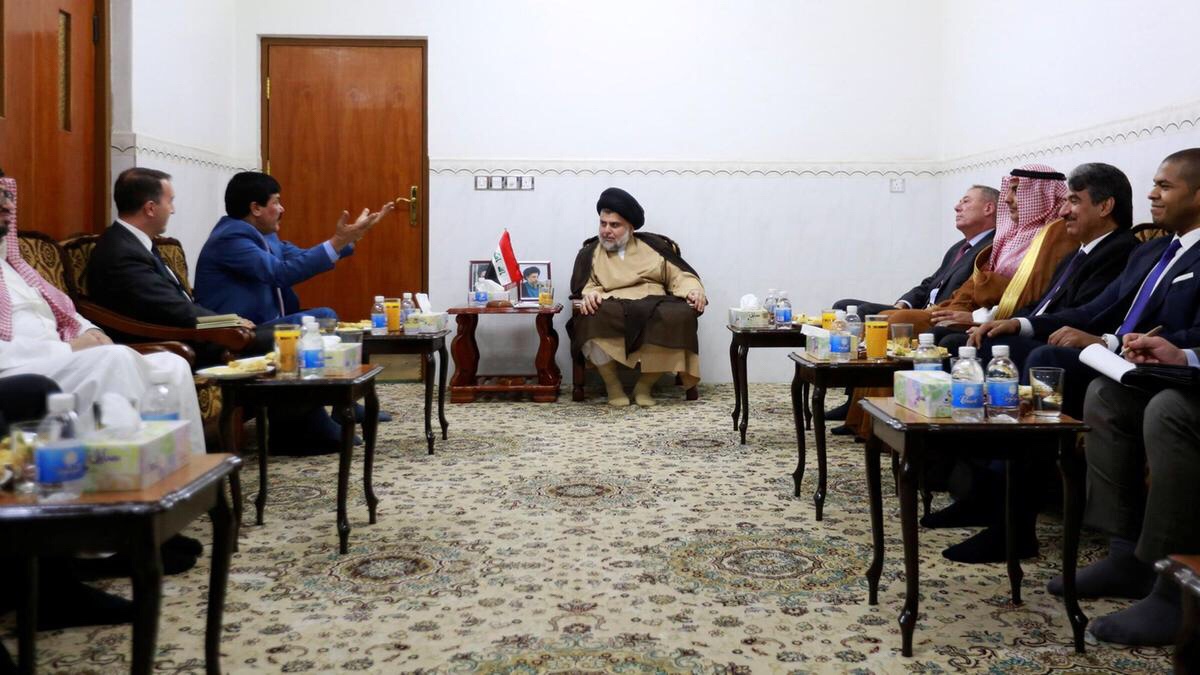
Iraq's Al Sadr advances in forming a government free of Iran's influence
Mina Aldroubi
Iraqi Shiite cleric Moqtada Al Sadr meets with ambassadors from Turkey, Jordan, Saudi Arabia, Syria and Kuwait, in Najaf, Iraq, on Saturday. Reuters
Iraq's Shiite cleric Moqtada Al Sadr met with Prime Minister Haider Al Abadi on Saturday, signalling that talks to form a coalition were progressing, hours after the cleric met with ambassadors from neighbouring countries that notably excluded Iran.
The nationalist cleric, who has been highly critical of Iran's role in the country, has ruled out forming an alliance with Tehran's allies in Baghdad.
Iraj Masjedi, Iran's ambassador to Iraq, was not invited to the talks. But the cleric's media office has not clarified whether the pair had held a separate meeting.
Mr Al Sadr has held talks with the ambassadors of Turkey, Saudi, Kuwait, Syria and Jordan to discuss bilateral relations.
He called for the support of neighbouring states in forming a technocratic government but stressed this was not an invitation for "interference".
The final results of Iraq's elections confirmed a breakthrough for the nationalist cleric, who was ahead of the internationally favoured Mr Al Abadi.
But his meeting with Mr Al Abadi indicated that the pair could form an alliance in the new government.
"During our meeting, we agreed to work together and with other parties to expedite the process of forming a new Iraqi government," Mr Abadi said, at a joint press conference.
"It will be a strong government, capable of providing to its citizens' services, security and economic prosperity".

Iraqi Shiite cleric Moqtada Al Sadr, left, and Prime Minister Haider Al Abadi said progress was being made towards a coalition government, at a press conference in Baghdad, Iraq, on May 20, 2018. Reuters
Mr Sadr, who ruled himself out of becoming prime minister, is looking to be the kingmaker and form a technocrat government from a dozen parties.
Although Mr Al Sadr's Marching Towards Reform alliance was the biggest winner in the parliamentary elections, it fell short of a majority in the May 12 vote, which saw record high abstentions with just 44.52 per cent turnout – the lowest since the first multiparty elections in 2005.
"Our door is open to anyone as long as they want to build the nation, and that it be an Iraqi decision," Mr Al Sadr said.
__________
Hussein Al Adely, spokesman of Mr Al Abadi's Victory Alliance, said that the meeting between the two leaders does not mean they would be forming a coalition.
"It’s too early to discuss coalition formation, this was a meeting to discuss the various viewpoints of other political blocs," Mr Al Adely said.
The Fatah bloc led by Hadi Al Amiri, one of the most powerful figures in Iraq, came in second. Mr Amiri, who leads an umbrella of predominantly Shiite paramilitary groups, has maintained close ties with Iran for decades.
The meeting on Saturday demonstrated that Mr Al Sadr would be accepting of Mr Al Abadi as prime minister, but it is likely that he will expect the United States-backed politician to show change to his supporters, Renad Mansour, senior research fellow at London's Chatham House, told The National.
"The immediate and obvious choice would be that Al Abadi and Al Sadr would come together to bring in some of the Sunni Kurdish groups and eventually maybe bring in Fatah to some extent, to sideline line Nouri Al Maliki’s State of Law coalition," Dr Mansour said.
Before the election, Tehran publicly stated it would not allow Mr Al Sadr’s bloc to govern close ally Iraq. Iran has previously influenced the choice of prime minister.
Winning the largest number of seats does not automatically guarantee that Mr Al Sadr will be able to handpick a prime minister.
Parties will have to align themselves to try to form a bloc large enough to achieve the parliamentary majority necessary to nominate a candidate. The government should be formed within 90 days of the official results, but negotiations are expected to drag on for months.
The election dealt a blow to Mr Abadi, but he could still emerge as a compromise candidate palatable to all sides because he has managed the competing interests of the US and Iran – unwitting allies in the war against ISIS – during his term in office.
During his meeting with the five ambassadors, the influential cleric pointed out that “the fundamental principle of our ties with neighboring countries is based on our friendship,” and called for the strengthening of existing relationships “in the interests of the public".
In recent days, Mr Al Sadr also met with Ammar Al Hakim, whose Hikma Movement trailed in seventh place, as well as with ambassadors from Iraq's neighboring countries, including Saudi Arabia, Tehran's major rival in the Middle East.
No comments:
Post a Comment